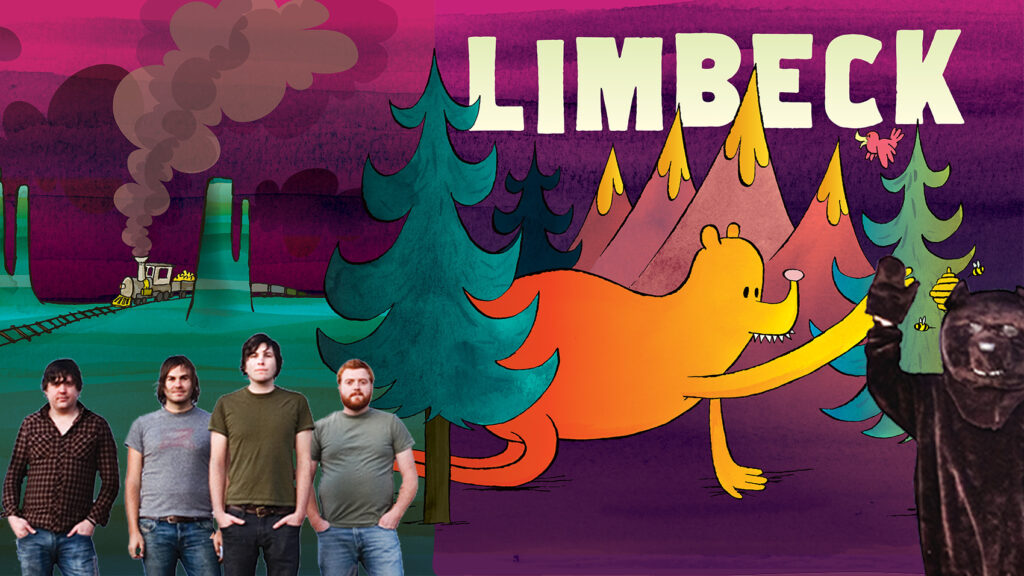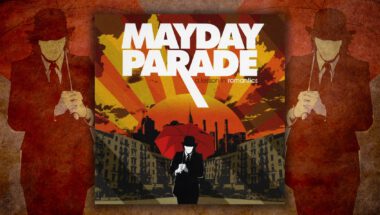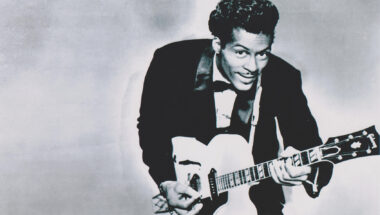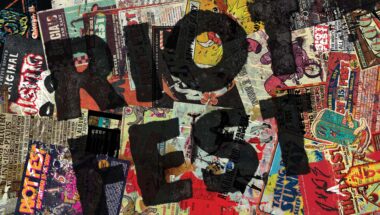You may not be familiar with Limbeck; but if you are, chances are they hold a special place in your heart. From 1999 to 2010, the Orange County, California-based rock act traversed the country countless times and toured alongside acts like Motion City Soundtrack, The All-American Rejects, and the Format. Additionally, not only are they the only band on the planet who recorded with a member of the Jayhawks before going on tour with New Found Glory, but they were also one of the last acts to exemplify what it was like to be a touring rock band before the ubiquitous influence of social media.
This experience was chronicled in the adventures they lived and sang about over the course of four full-length albums, and several EPs. In order to celebrate the ten-year reissue of their final album, 2007’s Limbeck, we caught up with all four band members — guitarist/vocalist Robb MacLean, guitarist Patrick Carrie, bassist Justin Entsminger and drummer Jon Phillip — as well as some notable fans to reminisce about a simpler time, when being in a band was more about writing songs than updating your Twitter status.
I view being in Limbeck as something very lucky.
… Patrick Carrie says from a car wash in Southern California. “I really don’t think that people can do the same things these days, because we were just playing music and traveling with a pretty serious work ethic prior to all of the technology happening; and that’s something I think we are all pretty thankful for.” Limbeck may have started as a pop-punk band, but good luck finding their debut 2000 album, This Chapter is Called Titles. “That record was a lot different and we didn’t really talk about it a whole lot,” MacLean explains. “We made that album on a tiny label and it kind of disappeared; we were happy about that because we were young kids trying to figure out what to do, and it didn’t take long for that record to get old to me.”
Correspondingly, most fans’ introduction to Limbeck was the 2003 album Hi, Everything’s Great, which came out on the iconic indie label Doghouse Records and was produced by Ed Rose (The Get Up Kids, Coalesce). “I think we kind of struggled with the fact that we came from the punk scene but had this rootsy rock sound,” Carrie admits. “As a guitar player I was incredibly influenced by people like Keith Richards and Mike Campbell from The Heartbreakers.”
Despite the fact that they were difficult to categorize, Limbeck gained a cult following for their Tom Petty-influenced brand of rock and impressive live shows, going on to release Let Me Come Home in 2005. Produced by Jayhawks frontman Gary Louris and Ed Ackerson in Minneapolis, the band’s third album displays a timeless quality that still resonates today — just like the other two albums.
“I worked at a record store after my old band, the Benjamins, broke up and we got a promo copy of Hi, Everything’s Great,” says Phillip who replaced previous drummer Matt Stephens in the band during Let Me Come Home‘s touring cycle in 2006. “I think I listened to it about 800 times. They became one of my favorite bands, so joining Limbeck was like joining the Beatles to me,” he continues, reminiscing about his trial by fire into the band. “I flew to New York at night, we practiced the next afternoon in [Former Steel Train and current Bleachers frontman] Jack Antonoff’s parents’ living room, then drove overnight to Atlanta to join up with Lucero for a month-long tour.” Phillip’s energy reinvigorated the band during this period, a fact which is evident on the new reissue of Limbeck, which features updated artwork, a stellar remastering job plus demos and B-Sides from those sessions.
If Hi, Everything’s Great was a transitional record showcasing a young band finding its roots, and Let Me Come Home was an attempt at courting the y’alternative world, Limbeck was the sound of the band fully realizing their own groove. The band’s final LP effortlessly bridged the gap between the Americana and emo worlds… which is what makes it such an important album ten years after its initial release. “We took a very different approach when we were making that record,” Phillip recalls. “Since we had two months in the studio, we recorded one song at a time so it gave us the chance to use totally different microphones and amps for each song.”
In fact, producer Ed Rose trusted the band so much that he gave them keys to the studio, so they’d continue recording in the evenings and weekends — and that approach also led to happy accidents that never would have occured in a more traditional setting. “The funny thing about ‘Reading the Street Signs’ is that we put the kick drum mic on totally backwards for that song; the next morning Ed walked in and pointed it out, but we kept our version anyway,” MacLean says. “Maybe it would have sounded better if it was the other way around? I don’t know if it really matters that much. Maybe it worked for the song, you know?”
Unorthodox recording style aside, following the release of the self-titled album the band spent another year promoting it. However, as gas prices continued to inflate, the band’s draw stayed the same, leading the group’s team morale to deflate. Anxiety reaching fever pitch. “The moment I knew we were defeated was when we on the final Format tour with Steel Train, the Honorary Title, and Piebald; it was right when the Format was getting big, and for whatever reason [our music] didn’t translate,” Entsminger recalls. “Don’t get me wrong, it was still an awesome tour, but we thought it was going to be the culmination of everything we worked towards, and had hyped it up so much in our heads that when it didn’t come through I knew things were going to be broken. That’s when I felt maybe we weren’t going to get over the hump.”
At the time, the members were all also approaching their thirties and starting families; so in 2008 the Traveling Limbeck Band stopped being a full-time traveling band; although in typical non-dramatic Limbeck fashion, they never released a formal statement when they went on hiatus the following year. They kind of just faded away for a while and focused on other aspects of their lives, accepting the fact that being in a touring band in your late twenties is way different than it is when you’re a teenager.
“The band slowing down was super gradual, and had a lot to do with how the world was going,” Carrie adds. “Gas got really expensive and the recession was happening, so we were playing the same places, getting paid the same amount of money, and then paying triple for gas; and I was like, ‘I don’t know if there’s longevity for this at this point.’” Carrie attests that streaming services biting into the band’s record sales on the road also contributed to the struggle.
It basically came down to ‘How can we continue to do this and not live with my parents?’
That sentiment was shared with the other members of the band, as well as many acts from that era who you maybe haven’t heard of. Take Apollo Sunshine: a great band who toured incessantly and put out amazing records, yet never really managed to crack into the mainstream. Looking back now, the fact that Limbeck straddled two incredibly different worlds was a large reason for both their success and eventual downfall.
“We came from the punk scene, which kind of pigeonholed us; because while we were happy there, we wanted to branch out as well,” Phillip admits. “It was frustrating for us, because our booking agent would submit for us to a tour with Ryan Adams, or the Lemonheads, or other bands that we thought would be a good match for us, but we would never get invited to those tours.”
Alternately, Limbeck would get taken out by bands like New Found Glory, who despite being vocal supporters of the band, were unable to successfully urge their legions of fans to get on board — fans who were more familiar with the Warped Tour than Wilco. “I think New Found Glory appreciated us, I don’t think their fans appreciated us that much,” Carrie says with a laugh when recounting a 2006 tour that featured the pop-punk legends, as well as the Early November and Cartel. “I think they were just too far ahead of their time,” New Found Glory vocalist and longtime Limbeck fan Jordan Pundik says when asked why he thinks the band never transcended their scene. “I think that if Limbeck’s records came out now they would be responded to in a different way with bands like the Lumineers being so popular. If those records were produced by a big name or something, who knows how it would turn out? But I love those recordings.”
Along the way, there were also plenty of bands like Motion City Soundtrack. Limbeck bonded with so strongly with their Twin Cities brethren, that they released a split 7-inch where each band covering the other’s songs. “I think even if we didn’t sound like a lot of the bands we toured with, we learned stuff from each other and appreciated the comfort of being on the road together… and that was especially true of Motion City Soundtrack,” Carrie recalls. “I think obviously we had some things in common musically with them, but it was more of a songwriting thing when it came to where they were coming from and what they were trying to get across that made us kindred spirits.”
The feeling is mutual. “What I love most about Limbeck is they make you feel instantly nostalgic for things you never knew you’d experienced until you’d hear them sing about it first,” recounts Motion City Soundtrack’s frontman Justin Pierre, who directed the two music videos from the Limbeck album in one day (“Big Drag” and “Let Me Come Home”). “I was lucky enough to get to know them in my twenties and watch them perform nightly, nearly a lifetime ago. Their music will forever be linked to some of my favorite memories both on and off tour and I will always think of them as brothers. They also turned me on to Smoking Popes and Kathleen Edwards, for which I am eternally grateful.
I cannot help but smile when I think about those lovely dudes.
He’s not the only one. Platinum-selling artists like Dashboard Confessional’s Chris Carrabba continue to sing the band’s praises to this day. “Limbeck’s legacy can be heard clearly in bands like the Gaslight Anthem, the Menzingers, the Front Bottoms and in garage-fueled anthems from far and wide,” says Carrabba.
Their live show was a beautiful mess of sweat and passion where club audiences sang as if they were in a packed arena. Limbeck was built in the grand tradition of the Replacements, Hüsker Dü, and Link Wray… bands that were almost as big as we still believe them to be.
It’s sentiments like this that nullify any jadedness that may arise within Limbeck when it comes to the fact that they never experienced the same mainstream success as some of their peers. “I’ve had a lot of time to think about it, and I think any resentment or frustration I’d harbored towards that kind of stuff is gone because life’s all about perspective,” Phillip explains. “If I sit down and start to think about what could have happened if we’d have gotten certain tours, or written those songs differently, or practiced more, it doesn’t really do you any good. We get to look back and be like, ‘These are the records that we made and wanted to make, and we had so much fun together,’ and I wouldn’t trade that for the world.”
The good news is that since Limbeck never officially broke up, they never had to stop playing occasional shows, which is what they’ve been doing as of late. Most recently, they opened a leg of dates for Piebald on the West Coast in 2016. “A lot of guys go out and have golf trips with their old friends, and going on these tours now is our version of a golf trip… and it’s totally paid for,” MacLean says. “We’re not actively looking to do stuff, but we have a hard time saying no if the right opportunity presents itself.”
In fact, now that the pressure’s off the band when it comes to success, they’ve come full circle in a way, back to where they were when they were teenagers in California, writing songs without regard for anything but the endless possibilities that lie ahead. “One of the things that was awesome about Limbeck, was that while a lot of bands would just want to go to their hotel and then the show, we’d want to stop on the way to see the World’s Biggest Prairie Dog or Billy the Kid’s grave,” Entsminger reminisces. “A lot of bands didn’t want to do fun stuff like that, but we were all about living it up and looking back I’m so happy that we did all of those things.
Every hotel room looks the same, but all those in-between moments, those are the really memorable parts of the journey.



